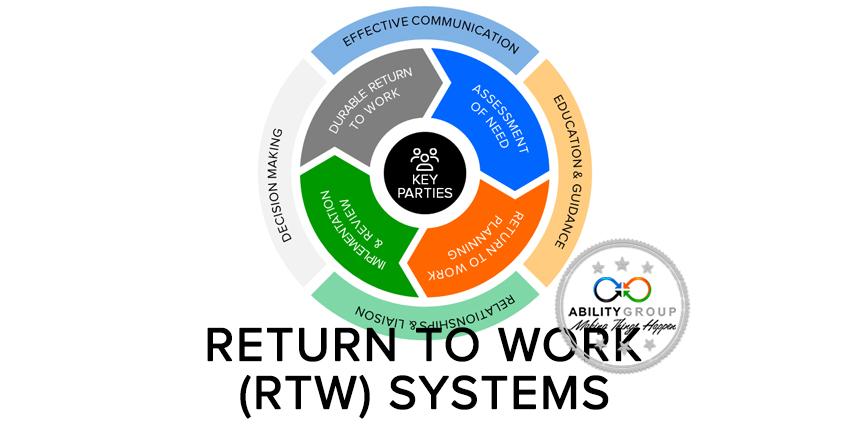An effective RTW system ensures safe, timely employee recovery and reintegration after injury or illness. We explore the components that are essential for developing an effective RTW System.
In our experience, an effective Return to Work (RTW) System incorporates:
- Early Intervention and Assessment: The RTW process begins with early intervention and assessment of the employee’s injury or illness.
- Would you like help integrating this into a full paragraph or presentation?
- Clear RTW policies ensure all stakeholders understand their roles and follow defined procedures.
- Foster collaboration among the injured employee, healthcare providers, supervisors, and HR. Encourage open communication and collaboration to develop personalised RTW plans tailored to the employee’s needs and abilities
- By working with healthcare professionals and rehabilitation providers determine suitable duties and accommodations that facilitate the employee’s gradual RTW
- Graduated RTW: Start with light duties and gradually increase hours and tasks as recovery progresses.
- Accommodations and Adjustments: Provide necessary accommodations and adjustments to support the employee’s RTW. This may involve adjusting workstations, schedules, tasks, or tools to match recovery needs.
- Ongoing Support and Monitoring: Offer ongoing support and monitoring throughout the RTW process to ensure the employee’s well-being and progress.
- Training and Education: Educate staff on RTW importance, early intervention benefits, and supportive workplace strategies.. Equip managers and supervisors with the skills to effectively manage RTW cases and support employees in their RTW journey
- Ensure compliance with regulatory requirements and provide accurate reporting on RTW outcomes and performance metrics
- Continuous Improvement: Regularly review the RTW system, gather feedback, and make adjustments to boost effectiveness.
Implementing these components builds an effective RTW system that supports recovery, reduces absenteeism, and boosts workplace culture and productivity.
Contact us to discuss your specific needs.
Source: State Insurance Regulatory Authority (SIRA)
Title: Establishing an effective return to work (RTW) system
Read Time: 10 Minutes

